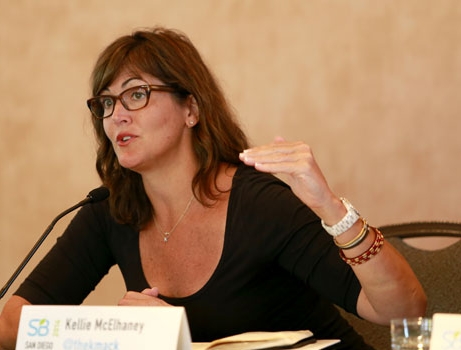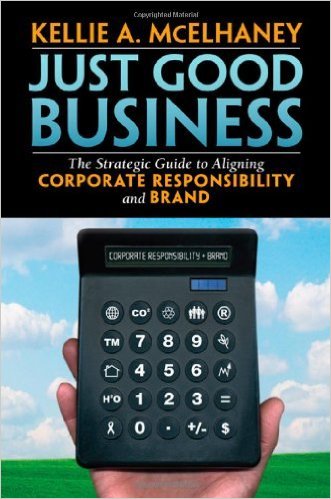Photo Credit: www.sustainablebrands.com
““Do something. Don’t do nothing.””
Dr. Kellie McElhaney founded the Center for Responsible Business at the Haas School of Business within the University of California at Berkeley, which solidified corporate responsibility as one of the core competencies and competitive advantages of Berkeley-Haas. Named a Faculty Pioneer by the Aspen Institute in 2005 for her leadership influence on business for the public good, she has served on the boards for Foundation Île à Vache, NetImpact and VolunteerMatch. Kellie teaches and consults on integrated CSR strategy. She is now developing an initiative around the economic and business value of investing in women within the new Institute for Business and Social Impact. In this interview, Kellie issues a restorative leadership call to courageously engage.
On Leading Transcript
Seana Lowe Steffen, host: What compels you to do the work that you do?
Kellie McElhaney, guest: An inner burning desire to do something with my life that leaves the world a little better than when I came into it. Not being content to just be here on the earth, but to actually leave it better. That was something I grew up with. My mother and my grandmother always used to say, whatever they were talking about – the house, classroom, the church – and wherever we were spending time, “What are you doing to leave it better than when you got here?”
Seana: If you could change one thing in the world with a snap of your fingers right now, what would you change and why?
Kellie: I would like to see a world that isn’t depleted of resources and clean air and clean drinking water – the whole concept of true sustainability. But also, I hear too many girls say that, “It just didn’t occur to me that business was a place that I could actually bring my desire to change the world.” I want them see that you can go into business with a desire to change the world. There are so many good people inside of business who want to create change. I think also the focus on short-term return for business is one thing I would change. Unfortunately, Wall Street still runs a lot of how public corporations operate. I would change Wall Street. I would get them to start thinking about valuing businesses beyond just quarterly returns. The U.S. gave $100 million to aid Haiti. Goldman Sachs, with one percent of its bonus pool, has the ability to give $190 million. That’s just crazy. Why do we think that’s okay?
Seana: When you think of all that you believe is possible for our world, what do you envision or dream?
Kellie: I think that business can be an even bigger force for positive social change, and when I say social I encapsulate the environment there. I do think that we are going to see a shift of business leadership. I do believe people are good. I think that we’ve lost some courageousness, and I do think we can get back the courage to do things differently.
Seana: What have you witnessed or experienced during your work that gives you hope?
Kellie: Certainly the explosion of interest in corporate responsibility. And this generation of Millenials gives me hope! I think they see the world differently than we all do. They feel very personally powerful to create change.The fact that my daughter Isabel, when she was 9, wrote a personal e-mail to the CEO of J Crew because she thought he over-packaged the shirt that we ordered in a box that was far too big gives me hope – and she got a response from him! So, the fact that she both felt personally powerful to do that and that he responded to her, the fact that the conversation is moving forward, gives me hope. I think that there are some really smart people working on solutions to some of the world’s most vexing problems.
Seana: What have you witnessed or experienced during your work that has you feel fearful?
Kellie: People who have the ability to act and don’t. I’m constantly struck by how much change really is just because one person is brave and speaks up, and I think about the millions of moments that people don’t speak up, where they really could have impacted big change. What causes me fear is our ability to check out. And I do understand, because I have that desire to check out too, because it is overwhelming and it is depressing, but if you just stay tuned-in through that feeling you often can figure out a way to contribute.
Seana: What does sustainability mean to you?
Kellie: For me, I tend to think of it in terms of a business strategy. Most of my work is dealing with the business world, so to me sustainability is a strategy to make the world a better place while at the same time sustaining the success of your business. So it really is that ability to contribute positively socially, environmentally, as well as to the business. On a personal level, it is absolutely leaving the world a better place than when you came in,and doing it in a way that sustains both you as an individual as well as the world.
Seana: If you could take us to witness a significant experience on your journey working for the world that you envision is possible, what would we witness and what would you want us to learn?
Kellie: The inspirational piece is how much is happening inside of corporate walls to focus on sustainability, likeWalmart’s push to put a sustainability score on every product that it sells. It’s just that these aren’t the things that get reported on the front page of the news, but there are really smart people at really big, powerful corporations working on some of these issues. I get to see the energy of business school students, and the sheer numbers of people who are working on issues of sustainability both inside of corporations and globally. I think the tipping point is a lot more near. I never thought I’d see the tipping point in my lifetime and I now actually do.
Seana: What is next for humanity?
Kellie: What I hope is next for humanity is that we realize that we are the solution and we stop waiting for some other entity. Business is made up of humanity, government is made up of humanity, non-profits are made up of humanity. I think we’ve been really looking for another somebody, we’ve been thinking somebody else is going to solve the problem. I think what’s next for humanity is that we’re going to realize it’s up to us to solve it.
Seana: Above all else, what would you have all leadership do at this time in our planet’s history?
Kellie: Look at the resources that are under their control and find a very strategic and targeted focus in the area of corporate responsibility. To focus their power and resources in a way that makes sense for them as a business. To do something in a really strategic, really focused area. So it’s just a huge plea to focus on what your core competency and resource base can do. Do something. Don’t do nothing. For corporate leaders specifically to really leverage their resources. They have so many resources at their disposal. And I know you said above all else, but one more thing — to talk about it. To talk about what they’re doing, even if they’re not doing it perfectly, even if they haven’t figured it out. Communication is often the best vehicle for improvement and impact.
Change The World Through Business
The Center for Responsible Business at Berkeley-Haas connects students, businesses, and faculty to mobilize the positive potential of business to create a more equitable, inclusive, and sustainable society. Building on more than a decade of research, teaching, and engaging with business, we educate and provoke thoughtful debate. The Center encourages sustainability-minded research and its application in the marketplace of commerce and ideas.
In Just Good Business, Kellie McElhaney shows leaders and managers exactly how to connect their CSR efforts to their company’s overall corporate strategy, business objectives, and core competencies. She provides a process for assessing whether CSR practices are reinforcing the brand, explains how to develop a unified CSR strategy, and lays out a framework of seven principles for leveraging the power of CSR branding.








